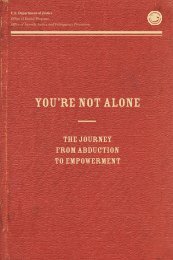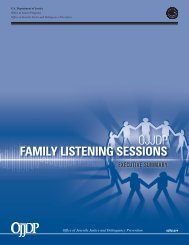OJJDP National Conference Program - Office of Juvenile Justice ...
OJJDP National Conference Program - Office of Juvenile Justice ...
OJJDP National Conference Program - Office of Juvenile Justice ...
Create successful ePaper yourself
Turn your PDF publications into a flip-book with our unique Google optimized e-Paper software.
Thursday, October 13, 1:30 p.m. – 3:00 p.m.(continued)research perspectives and the family and youth perspective,based on focus group discussions from the <strong>National</strong> <strong>Juvenile</strong>Information Sharing Initiative’s pilot sites. The goal <strong>of</strong> thissession is to promote improved procedures and policies <strong>of</strong>information sharing across federal, state, and local agenciesand with youth and juvenile services within communities.<strong>National</strong> Center for Youth in Custody(Track: Youth in Custody)Potomac 1–3David Rousch, <strong>National</strong> Partnership for <strong>Juvenile</strong> ServicesTim Decker, Council <strong>of</strong> <strong>Juvenile</strong> Correctional Administratorsand Missouri Division <strong>of</strong> Youth ServicesElissa Rumsey, <strong>OJJDP</strong>Moderator: Carol Cramer Brooks, <strong>National</strong> Center for Youthin CustodyPresenters in this workshop will provide the foundationalbasis for the work <strong>of</strong> the <strong>National</strong> Center for Youth in Custodyas well as an overview <strong>of</strong> the services that it provides.Presenters will discuss the Center’s three priority serviceareas: (1) providing those involved in youth custody serviceswith tools to improve their organizational culture, particularlythe conditions <strong>of</strong> confinement; (2) supporting and enhancinginvolvement in the core requirements <strong>of</strong> the <strong>Juvenile</strong> <strong>Justice</strong>and Delinquency Prevention Act; and (3) understanding,strengthening, and promoting family and community engagementin all aspects <strong>of</strong> youth custody.Children’s Advocacy Centers: MultiagencyPartnerships To Protect ChildrenPotomac 4–6Robert E. Cramer (retired), Former Member <strong>of</strong> CongressChris Newlin, <strong>National</strong> Children’s Advocacy CenterMuriel Wells, <strong>National</strong> Children’s Advocacy CenterModerator: Lou Ann Holland, <strong>OJJDP</strong>Panelists will discuss Children’s Advocacy Centers, whichuse multidisciplinary teams <strong>of</strong> pr<strong>of</strong>essionals involved in childprotective, victim advocacy, law enforcement, prosecution,and physical and mental health services to coordinate theinvestigation, treatment, and prosecution <strong>of</strong> child abusecases. The panel will examine how this innovative modelcoordinates the response from the criminal and civil systemswith a strong focus on the needs <strong>of</strong> each individual childand how Children’s Advocacy Centers have revolutionizedthe response to child sexual abuse in the United States andother countries.Changing the Culture <strong>of</strong> Violence: A Neighborhood-Based Approach to Crime PreventionChesapeake 1–3David E. Whittaker, Chicago Area ProjectHoward Lathan, Chicago Area ProjectMichael A. Borum, South Shore Drill TeamJoy Hernandez, Chicago Area ProjectRickey Williams, Chicago Area ProjectModerator: Karen J. Bachar, <strong>OJJDP</strong>This session will examine successful strategies and locallybased approaches to community crime prevention thatengage indigenous leaders, residents, and youth in planningand implementing strategies to reduce youth involvement incriminal activity. This session will also explore 75 years<strong>of</strong> the Chicago Area Project’s practices and programs,including its advocacy-based approach to neighborhood andyouth development and capacity-building strategies thatsupport neighborhood youth and community developmentpractitioners.Following the Evolution: What Works, the Model<strong>Program</strong>s Guide, and CrimeSolutions.gov(Track: Reconstructing the Ivory Tower)Chesapeake 4–6Denise Gottfredson, Department <strong>of</strong> Criminal <strong>Justice</strong> andCriminology, University <strong>of</strong> MarylandMarcia Cohen, Development Services Group, Inc.Phelan Wyrick, <strong>Office</strong> <strong>of</strong> <strong>Justice</strong> <strong>Program</strong>sModerator: Brecht Donoghue, <strong>OJJDP</strong>Presenters will discuss the evolution <strong>of</strong> the <strong>Office</strong> <strong>of</strong> <strong>Justice</strong><strong>Program</strong>s’ (OJP’s) evidence-based efforts, how OJPidentifies and reviews programs, and the current state <strong>of</strong>evidence-based program development. The discussion willfocus on the publication <strong>of</strong> the <strong>National</strong> Institute <strong>of</strong> <strong>Justice</strong>’sPreventing Crime: What Works, What Doesn’t, What’sPromising in 1997; <strong>OJJDP</strong>’s development <strong>of</strong> the Model <strong>Program</strong>sGuide in 2000; and the June 2011 launch <strong>of</strong> OJP’sCrimeSolutions.gov, which <strong>of</strong>fers online resources that userigorous evaluation evidence to assess program effectivenessacross a broad range <strong>of</strong> juvenile and adult criminaljustice and victims’ programs.The Invisible Population: Mothers in the <strong>Juvenile</strong><strong>Justice</strong> System (Track: Girls at the Margin)Chesapeake D–FJeannette Y. Pai-Espinosa, The <strong>National</strong> Crittenton FoundationMalika Saada Saar, The Rebecca Project for Human RightsLaurie A. Westley, Girl Scouts <strong>of</strong> the USAModerator: Kristie Brackens, <strong>OJJDP</strong>AGENDA AT A GLANCEAGENDA: THURSDAY, OCTOBER 13Panelists will discuss the needs <strong>of</strong> pregnant and parentingyoung women under correctional supervision and share21



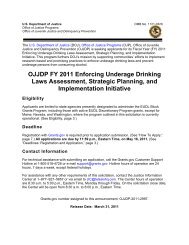
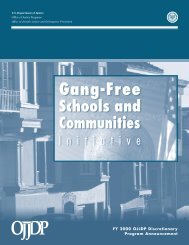
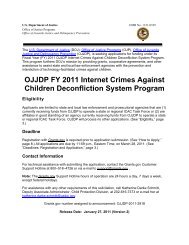
![Chapter 5 [PDF] - Office of Juvenile Justice and Delinquency ...](https://img.yumpu.com/46584340/1/190x245/chapter-5-pdf-office-of-juvenile-justice-and-delinquency-.jpg?quality=85)

